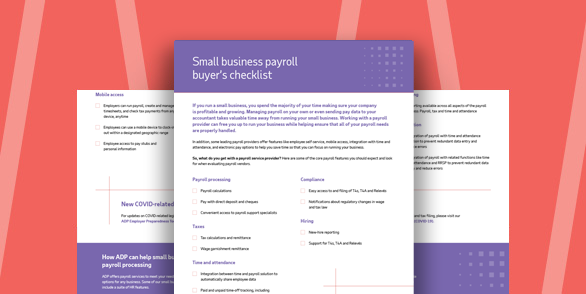You have a winning idea plus the passion and skills to make it a success. But the process of getting your business off the ground can be overwhelming. Here are a few tips to get you started.
What do you need to start a small business?
No matter how eager you are to get a product into market, taking the time to create a solid foundation now will help increase the chances of your business surviving long-term. Some of the basic things you may need to start a small business include:

- Idea backed by market research
- Business plan
- Funding and bank account
- Business structure
- Business name
- Business location
- Licenses and permits
- Insurance policies
What is a good business to start?
A good business to start is usually one that fills an unmet consumer need. Think of an everyday problem that’s yet to be solved or ways to improve an existing solution by making it faster, cheaper, or easier to use. Preferably, your idea should be something that you’re passionate about or have some existing level of expertise.
Some businesses, such as dog walking, have low start-up costs, while others, like a restaurant, may require considerable investment. And if you’re looking for a get rich quick scheme, you may be disappointed. Most small businesses take considerable time and effort before turning a profit.
How to start your own small business
Taking an idea to market or making a dream become reality typically takes a series of carefully planned business decisions. While not every business follows the same path, most take some of these steps:
Perform market research around your idea
Market research can help you mitigate risk because it lets you know how much of a demand there is for your product or service and the level of existing competition. It also provides demographic information on your target customers, such as their income and where they live.
You generally have two options when it comes to research – review existing sources or conduct your own analysis. Relying on previously gathered data can save you time and money, but it might not be current or specific enough to your target clientele. If you start your research from scratch, you have the advantage of engaging with customers directly through focus groups, one-on-one interviews and surveys.
Create a business plan
A business plan explains your goals and how you hope to achieve them. If you need funding for start-up costs, many investors will want to see your plan so they can assess your potential profitability. Business plans can also help you attract partners and employees.
Whichever plan you choose for your new business, most include at minimum:
- A description of your product, its value proposition, and how you plan to market it
- How much investment you require and the amount of revenue you expect to generate
- Your target audience and the customer experience
Finance your business
Start-up costs are one of the obstacles that sometimes prevent people from ultimately pursuing their dream. The good news, however, is that even if you don’t have much money at your disposal, there are several ways to fund your business, including:
- Bootstrapping: Self-funding is advantageous because you maintain complete control of your business. On the downside, it sometimes comes with the highest personal financial risk.
- Venture capital investments: Venture capitalists or “angel investors” may be willing to fund your business, but they usually expect membership on your board of directors or some stake in the company. You may need a detailed business plan to secure a capital investment.
- Small business loans: If you don’t have enough money, but still want to keep full ownership of your business, a loan might be advantageous. Be prepared to show banks and credit unions a comprehensive business plan, as well as your estimated expenses and financial projections.
- Crowdfunding: Some people invest in a business in exchange for perks, as opposed to a share of the profits or company ownership. Because these perks are usually merchandise or name recognition, your business may need to be in the general consumer product or creative industries to take advantage of crowdfunding.
Choose your business structure
How you plan to structure your business will typically have legal and tax implications for the foreseeable future. That makes this decision a critical one. Some of the more popular business structures are:
- Sole proprietorship: This is the most common structure for solo entrepreneurs.
- Partnership: If you are starting a business with one or more individuals, then a partnership structure might be right for you.
- Limited liability company: An LLC blends the limited liability features of a corporation with the tax efficiencies and operational flexibility of a partnership.
- Corporation: More complex from a legal and tax standpoint and are therefore more common among larger companies.
If you choose to incorporate, you need a business number (BN) or need a CRA program account. To learn more about how to get a business number, visit CRA Government of Canada page.
Choose your business name
This is how your business will be recognized by the public. Your business name should:
- Reflect your brand and values
- Convey the services you provide or products you sell
- Work as a logo and resonate on social media and other marketing platforms
You’ll also want to make sure your business name isn’t already taken. In many cases, if someone is already using a name, you cannot legally use it. The Government of Canada recommends to check whether a name is taken by:
- Searching the internet: Check to see if the internet domains or social media handles are already taken. If you plan on doing business outside Canada, check if anyone is using the name in other countries.
- Search national name databases: Search one or both depending on where you want to set up your business. Canadian corporate names and trademarks database or Canada’s business registries.
- Provincial and territorial databases: Registering a trade name at the provincial or territorial level does not give the business exclusive rights to use the name at the federal level. Find links to specific databases here.
Once you’ve settled on a name that suits your organization and confirmed its availability, you should trademark it and purchase a recognizable version of it as a domain name. Then, create a presence on social media channels (LinkedIn, Twitter, Facebook, Instagram, etc.) by opening accounts with your business name.
Register your business with the government
You may have to register with the government of Canada before you start operating your business. Before you begin registering, you need:
- Location of your main office
- Which province or territories your business will operate in
- Proposed business name
- Business structure
Obtain any necessary licenses or permits
Before you open for business, take a moment to make sure that you have all the correct licenses, permits, and insurance policies to operate legally. The last thing you want at this stage is to be shut down by a government agency.
If your business operates in certain industries, such as agriculture and broadcasting, you might need a federal license. Other industries, like health care, typically require professional licenses. Even if you don’t fall into one of these categories, you may need some form of permission to conduct business.
Choosing your accounting and payroll system
Before you make an initial sale or hire your first employee, you most likely need a method of managing your finances and paying the people who work for you. You can tackle these important tasks yourself using spreadsheets, hire an accountant, or work with a payroll provider.
If you’re a solo operation or only have a few employees, a manual approach to payroll may save you money. It is, however, time consuming and comes with the most risk because you could be fined for mistakes. Hiring an accountant might give you more peace of mind, but they’re usually expensive and you may lose some control of the process. A payroll provider, on the other hand, is often the best of both worlds, giving you control and risk reduction, while also saving you time.
Payroll providers like ADP offer products that in most cases, can automatically pay your employees, file taxes on your behalf and help you comply with applicable government regulations. Our payroll also seamlessly integrates with many types of accounting software so you can manage your finances from one place. A provider like ADP serves business of all sizes so whether you need payroll for a small business or something larger, we can help.
Create a web presence
Since most customers use the internet to search for goods and services, a helpful and attractive website can be an integral piece of your marketing strategy. The ideal web presence should:
- Engage your target audience
- Include key terms for search engine optimization (SEO)
- Display your business name and/or logo
- Have creative content
- Integrate social media channels
Although there are some platforms that allow you to build a site with little or no development knowledge, it may be worth hiring a professional if you want to present a truly polished image of your business. Look for digital agencies who specialize in helping small businesses because they’re usually more likely to understand your needs and meet your budget requirements.
Frequently Asked Questions
How can I start my own business with no money?
- Choose a business idea that doesn’t have upfront capital
- Wear many hats
- Use free resources
- Keep a day job or part time job to support your idea
Do start-ups have to pay taxes in Canada?
Start-ups have to file an income tax return with the CRA yearly to report their business income and expenses. Business structure determines the type of income tax return required.
What are the four basics of starting a business?
The four basics of starting a business is to figure out your business name, business structure, registrations needed, and any other licenses necessary. These are important legal prerequisites.
Learn More
Talk to us about your small business challenges, and we’ll walk you through the solutions we offer — including how companies like yours are using them. Call 866-622-8153 or start a quote to get started.





